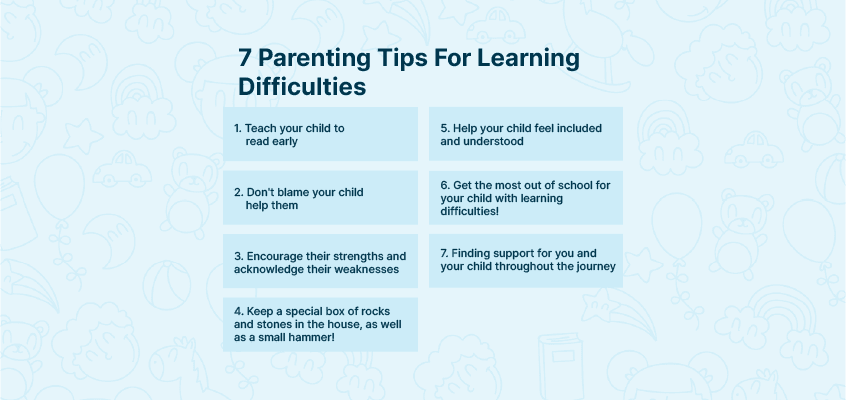Introduction
Children with learning disabilities may develop low self-esteem. They may not participate in day-to-day activities or become disengaged at school. Positive reinforcement can help them overcome the shame and stigma often associated with learning disabilities.
When these children feel secure and accepted, they become more confident about facing and managing their learning difficulties.
Provide your youngster with the mental and interpersonal skills they’ll need to overcome challenges rather than striving to “cure” the learning disability.

Our Wellness Programs
How to understand what your child is feeling For learning difficulties
It is not impossible to overcome a learning disability. Remind yourself that your challenges are not unique. Teach your child how to address these challenges without becoming discouraged or overwhelmed.
Do not allow testing, school staff, and endless forms to distract you from the essential task—giving your child moral and emotional support.
Looking for services related to this subject? Get in touch with these experts today!!
Experts

Sapna Zarwal

India
Psychologist
Experience: 19 years

Vasudha Agarwal

India
Psychologist
Experience: 13 years

SEEMA TANEJA

India
Psychologist
Experience: 30 years

Munira Soni

India
Psychologist
Experience: 7 years

Ruchi Garg

India
Psychologist
Experience: 6 years

Manveen Kaur

India
Psychologist
Experience: 9 years
The importance of understanding your child’s learning difficulties
Be vocal so that you can get your child more assistance. The journey may be tiresome at times, but you can significantly impact your child’s life by being calm and reasonable yet firm.
You can also seek out experts in the area and can offer guidance.
7 Parenting Tips For Learning Difficulties:
Here are a few parenting tips for learning difficulties that can benefit your child in the long run:
1. Teach your child to read early.
Ensure you research and know new instructional disability programmes, therapies, and educational tactics. Parents often seek assistance from others at first—teachers, therapists, and physicians. But as you know your child best, you should take the lead in discovering the materials they’ll need to learn.
2. Don’t blame your child; help them.
Your youngster will imitate your actions. Your child is more likely to embrace your point of view. So when you perceive the difficulties as speed reduction rather than roadblocks, they will do the same. Determine what best suits your child and implement it as effectively as possible.
You may visit United We Care and consult with a licensed counsellor or therapist to better understand your child’s needs.
3. Encourage their strengths and acknowledge their weaknesses.
Identify your child’s chosen learning style. Whether or not they have a learning disability, everyone has a unique learning style. Some people learn better by seeing or studying, while others learn better by hearing and doing.
You can help a youngster with a learning challenge by discovering their preferred learning method. Do you know if your child learns visually, auditorily, or kinesthetically? Once you’ve figured out how your child learns best, you may recommend that their school emphasises that type of learning to aid the child.
4. Keep a special box of rocks and stones in the house, as well as a small hammer!
Consider your achievements in life rather than your academic achievements. Different people define success differently, but your ambitions and hopes for your child are likely to extend beyond good grades. Perhaps you want your children’s future to involve satisfying employment and fulfilling relationships or a loving family experience.
Qualities like a sense of individuality, the willingness to ask for something and receive help, persistence in the face of adversity, the ability to form healthy relationships can help your child succeed holistically.
5. Help your child feel included and understood.
Remember to keep an eye out for yourself. Stay detached from your child’s problems and look after yourself well. It’s easy to get caught up in your child’s expectations and forget about yourself.
Look after your needs to raise your child in a healthy environment. It is easier to help with your child’s problems effectively and help them stay calm and attentive when you’re peaceful and focused.
Your spouse, friends, and family members may be helpful collaborators on the journey to making your child feel included.
6. Get the most out of school for your child with learning difficulties!
It’s critical to recognise your child’s stress. Stress can exhibit itself in several forms. When your child is worried, they may respond in ways that differ from yours. The most obvious signs of stress include agitation, sleep problems, and excessive anxiety.
Some people, especially children, shut down, tune out, and withdraw when under stress. It’s easy to overlook these red flags, so keep a watch out for anything unusual. Encourage youngsters to build excellent emotional and physical habits.
After all, living with a learning disability is challenging. Try giving outlets to express their frustration, rage, or disappointment. Do your best to empathise with your child’s feelings with learning difficulties.
7. Finding support for you and your child throughout the journey
Some caregivers hide their child’s developmental disorder with good intent. However, this could come off more as shame or embarrassment. Extended family members and acquaintances may be uninformed of your child’s disability and feel that their behaviour is due to idleness or restlessness. When they’re careful and alert, they can assist your child’s development.
Siblings may assume that their learning-disabled brother or sister enjoys more attention, less discipline, and preferential treatment. Even if they know that their sibling has a developmental disability, they may experience resentment.
Parents may help their children cope with their feelings by reminding them of their values and providing homework assistance.
Conclusion
To understand how you can improve your parenting to help your child with learning difficulties, visit the top mental health professionals.


















